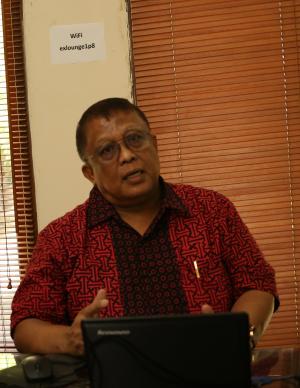Professor of IPB Create a Decomposer to Reduce Urea up to 30 Percent

In 1960, Indonesian farmers were introduced to chemical fertilizers and pesticides. Chemical fertilizers and pesticides have made farmers complacent because farming was easy, which in turn makes them forget about organic fertilizers. This causes annual increase in the use of chemical fertilizers and pesticides. In addition, to speed up the soil cultivation, straw was burned or taken to another place. This means that there has been a reduction of nutrients in the soil. Subsequently, in the 1990s ground conditions got worse, the farmers began to complain, production fell, pest became rampant and harvest failed.
"Often there are reports of farmers’ land hardening. The solution is to reduce the use of chemical fertilizers, use organic fertilizers and biological pesticides. Organic fertilizer can fix the whole nature of the soil, while chemical fertilizers only fix part of the soil characteristics," said Professor of the Faculty of Agriculture, Bogor Agricultural University (IPB), Prof. Iswandi Anas Chaniago in his scientific oration held at the Auditorium Andi Hakim Nasution, Dramaga Campus, Bogor, Saturday (9/4).
According to him, until now, the agricultural system in Indonesia has not been sustainable. Farmers are reluctant to use organic fertilizer because its production process is long. Therefore, the role of technology is required such as the development of decomposers. Farmers simply provide raw material for organic fertilizer.
"Once there was a development to go back to the organic fertilizers, but ended because the price of urea is still cheap by subsidies. We also do not consider the environmental pollution due to the use of chemical fertilizers. Currently, 80 percent of agricultural land of the farmer has been damaged. Therefore, it should be corrected by reducing the use of chemical fertilizers," he explained.
The role of organic fertilizer is very significant in improving soil conditions. However, the existence of organic and chemical fertilizers should not be put into a conflict. An example of biological fertilizer products by Prof. Iswandi already in use is Azozo, potassium and phosphate solvents.
"We have biost, already commercial, and super biost-IPB. They are already included in the national flagship program of biofertilizers for seven commodities. This fertilizer reduces fertilizer cost by approximately 30 percent. Yield are equal to or more than conventional production. This fertilizer has been in the test phase for two years," he said.
There is an efficient system of rice cultivation and has been proven by Prof. Iswandi, called System of Rice Intensification (SRI). This system reduces the input of fertilizer, water and seeds, but the production remains increased.
"SRI is very efficient. Use young seedlings, plant one seedling per hole in shallow soil and do not get flooded. The fertilizer can be chemical or combined. On good soil and organic fertilizers available, it can become an organic SRI," he said.
From the test results, one seed can produce more than 70 puppies. By the conventional method (standing water), roots do not develop, while with the SRI, the roots grow. Increased production can be up to 30 percent.
"At first I did not believe it, but I tried myself with my students and it turned out right. I also develop SRI in Malaysia. It is built there in a Training Center," he said. (Mtd)



